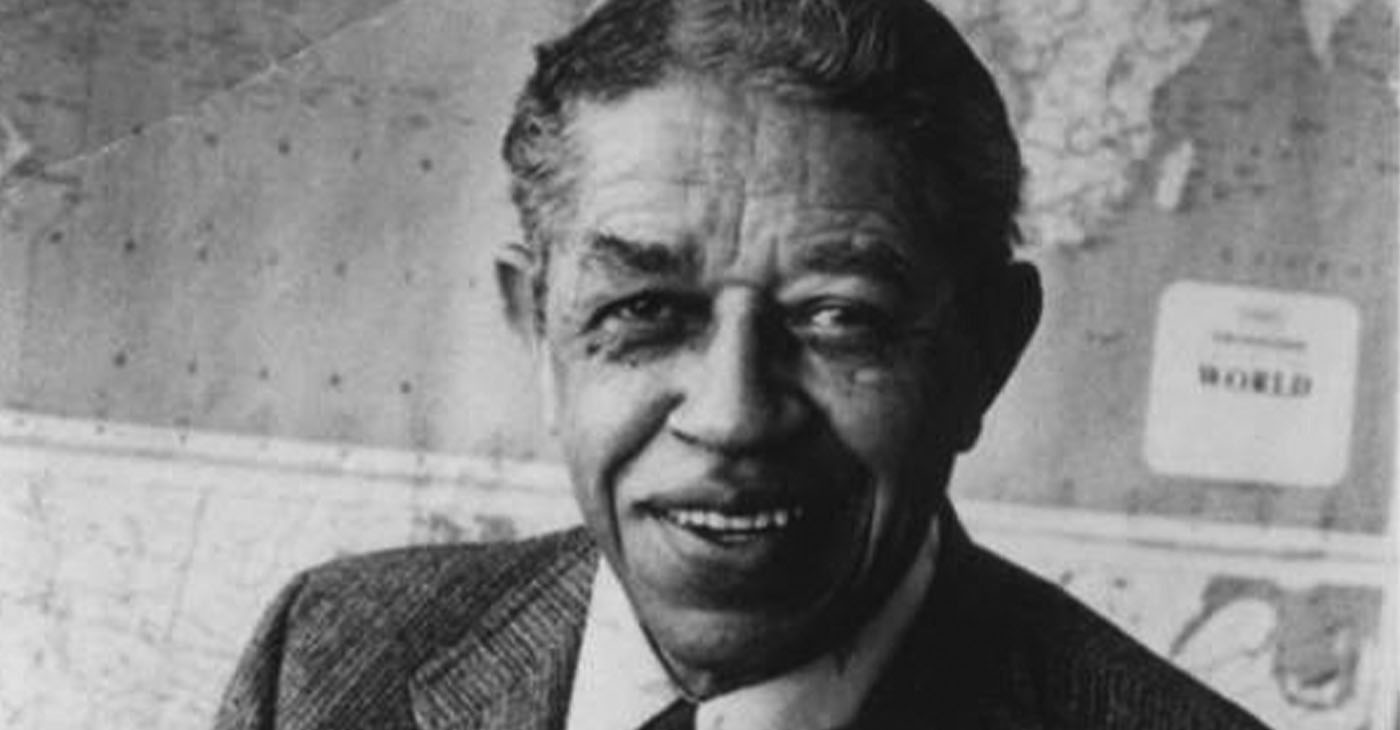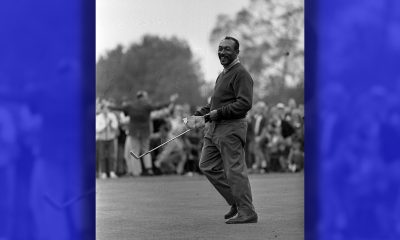Black History
Malvin Russell: Goode Black Radio Reporter Who Covered Cuban Missile Crisis
Malvin Russell Goode (1908–1995) ignored the cultural roadblocks preventing minorities from entering and having success in the field of journalism.

By Tamara Shiloh
About 80% of Black adults expect that national news stories will be accurate. About 53% feel connected to their main news source overall. One in three say they have a lot of trust in the information they get from local news organizations. These facts aside, Black people have historically been underrepresented in the newsroom.
Malvin Russell Goode (1908–1995) ignored the cultural roadblocks preventing minorities from entering and having success in the field of journalism.
After graduating from the University of Pittsburgh in 1931, Goode continued his employment as a steelworker for five years. He then worked at various jobs: a probation officer, director for the YMCA, manager for the Pittsburgh Housing Authority, and eventually in the public relations department of the Pittsburgh Courier, where, at age 40, he moved into the position of reporter.
He later took a leap into radio broadcasting, beginning with a 15-minute, twice-weekly commentary for KQV Radio in Pittsburgh. His popularity began to soar.
After 13 years in broadcasting, Goode was hired by ABC in 1962, making him the national news network’s first African American correspondent. He dove at the chance to present all sides of news coverage.
Seven weeks into Goode’s network career, the Cuban Missile Crisis developed. The lead ABC correspondent for the United Nations was on vacation, so Goode reported on the entire story for the network. He continued to cover the U.N. until his retirement in 1973.
Throughout his career, Goode also reported on political conventions, and civil and human rights issues during the 1960s.
Goode was jailed many times in attempts to harass and intimidate him for his involvement with civil rights issues. He was active with the NAACP and traveled across the country to give speeches for more than 200 local chapters.
He knew and interviewed many prominent civil rights leaders and athletes such as Martin Luther King Jr., Malcolm X, and Jackie Robinson.
Post retirement, he worked for the National Black Network, again covering the U.N., civil rights, and politics, a move that proved challenging.
Goode was born in White Plains, Va. His grandparents had once been slaves, and their history informed Goode’s entire family life, giving them ambition and determination.
His mother attended West Virginia State University, and often stressed the importance of education to her children. Goode would remember these lessons for the rest of his life. This can be seen by his determination and his interest in events that affected the world.
About Goode, former ABC anchor Peter Jennings, who considered him a mentor, once said: “Mal could have very sharp elbows. If he was on a civil rights story and anyone even appeared to give him any grief because he was black, he made it more than clear that this was now a free country.”
Goode died of a stroke on Sept. 12, 1995, in Pittsburgh.
Activism
Oakland Post: Week of April 24 – 30, 2024
The printed Weekly Edition of the Oakland Post: Week of April 24 – 30, 2024

To enlarge your view of this issue, use the slider, magnifying glass icon or full page icon in the lower right corner of the browser window. ![]()
Activism
Oakland Post: Week of April 17 – 23, 2024
The printed Weekly Edition of the Oakland Post: Week of April 17 – 23, 2024

To enlarge your view of this issue, use the slider, magnifying glass icon or full page icon in the lower right corner of the browser window. ![]()
Black History
Matthew Henson: Explorer Extraordinaire
Matthew Henson, a trailblazing explorer who overcame countless obstacles to leave an incredible mark on history. Born on August 8, 1866, in Charles County, Maryland, his journey is a testament to the power of determination and the spirit of adventure.

By Tamara Shiloh
Matthew Henson, a trailblazing explorer who overcame countless obstacles to leave an incredible mark on history. Born on August 8, 1866, in Charles County, Maryland, his journey is a testament to the power of determination and the spirit of adventure.
Henson’s life began amidst the backdrop of post-Civil War America, where opportunities for African Americans were scarce. From a young age, he possessed an insatiable curiosity about the world beyond his small town. At the age of 12, he embarked on a journey that would change the course of his life forever when he joined a merchant ship as a cabin boy.
His most famous expedition was his journey to the Arctic with renowned explorer Robert E. Peary. In 1887, Henson joined Peary’s crew as a seaman and quickly proved himself to be invaluable with his skills as a navigator and craftsman. Over the course of several expeditions, Matthew endured extreme cold, treacherous terrain, and grueling conditions as he and Peary sought to reach the elusive North Pole.
In 1908–09, Peary set out on his eighth attempt to reach the North Pole. It was a big expedition, with Peary planning to leave supplies along the way. When he and Henson boarded their ship, the Roosevelt, leaving Greenland on August 18, 1909, they were joined by a large group. This included 22 Inuit men, 17 Inuit women, 10 children, 246 dogs, 70 tons of whale meat, blubber from 50 walruses, hunting gear, and tons of coal.
In February, Henson and Peary left their anchored ship at Ellesmere Island’s Cape Sheridan, along with the Inuit men and 130 dogs. They worked together to set up a trail and supplies along the way to the Pole.
Peary picked Henson and four Inuit people to join him in the final push to the Pole. However, before they reached their destination, Peary couldn’t walk anymore and had to ride in a dog sled. He sent Henson ahead to scout the way. In a later interview with a newspaper, Henson recalled being in the lead and realizing they had gone too far. The group turned back, and Henson noticed his footprints helped guide them to their destination. At that location, Henson planted the American flag.
Henson’s legacy extends far beyond his expeditions to the Arctic. He shattered racial barriers in the world of exploration and inspired countless individuals, regardless of race, to dream big and pursue their passions. In 1937, he was finally recognized for his achievements when he was inducted into The Explorers Club, an organization dedicated to promoting scientific exploration and field research.
Matthew Henson died in the Bronx, New York, on March 9, 1955, at the age of 88.
-

 Activism4 weeks ago
Activism4 weeks agoOakland Post: Week of March 27 – April 2, 2024
-

 #NNPA BlackPress4 weeks ago
#NNPA BlackPress4 weeks agoBeloved Actor and Activist Louis Cameron Gossett Jr. Dies at 87
-

 Community2 weeks ago
Community2 weeks agoFinancial Assistance Bill for Descendants of Enslaved Persons to Help Them Purchase, Own, or Maintain a Home
-

 Activism3 weeks ago
Activism3 weeks agoOakland Post: Week of April 3 – 6, 2024
-

 Business2 weeks ago
Business2 weeks agoV.P. Kamala Harris: Americans With Criminal Records Will Soon Be Eligible for SBA Loans
-

 Activism2 weeks ago
Activism2 weeks agoOakland Post: Week of April 10 – 16, 2024
-

 Community2 weeks ago
Community2 weeks agoAG Bonta Says Oakland School Leaders Should Comply with State Laws to Avoid ‘Disparate Harm’ When Closing or Merging Schools
-

 Community1 week ago
Community1 week agoOakland WNBA Player to be Inducted Into Hall of Fame
























































